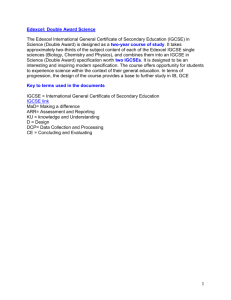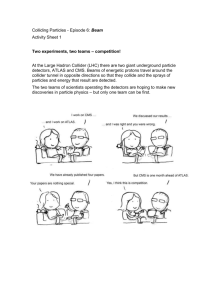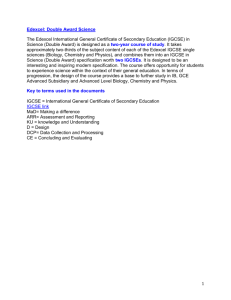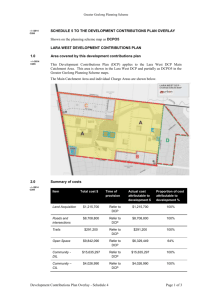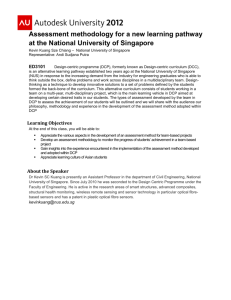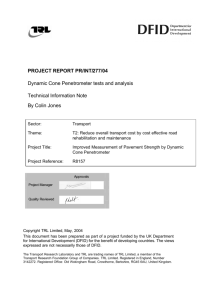1515 12th Avenue Seattle WA 98122 p 206-329-2629 f 206-329
advertisement
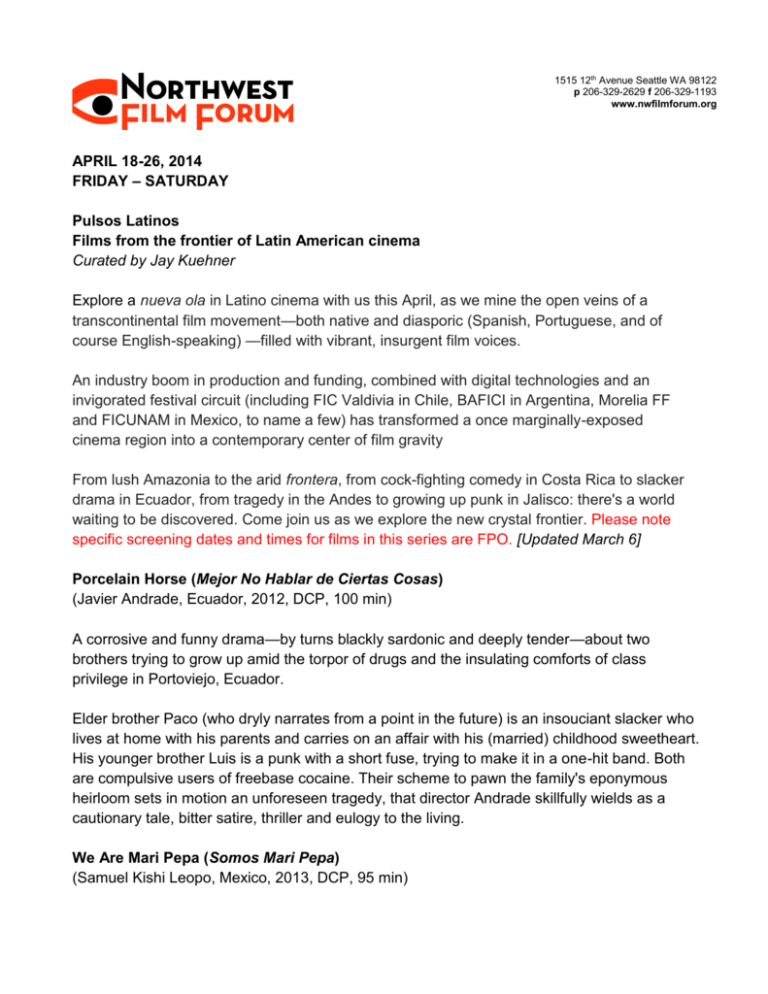
1515 12th Avenue Seattle WA 98122 p 206-329-2629 f 206-329-1193 www.nwfilmforum.org APRIL 18-26, 2014 FRIDAY – SATURDAY Pulsos Latinos Films from the frontier of Latin American cinema Curated by Jay Kuehner Explore a nueva ola in Latino cinema with us this April, as we mine the open veins of a transcontinental film movement—both native and diasporic (Spanish, Portuguese, and of course English-speaking) —filled with vibrant, insurgent film voices. An industry boom in production and funding, combined with digital technologies and an invigorated festival circuit (including FIC Valdivia in Chile, BAFICI in Argentina, Morelia FF and FICUNAM in Mexico, to name a few) has transformed a once marginally-exposed cinema region into a contemporary center of film gravity From lush Amazonia to the arid frontera, from cock-fighting comedy in Costa Rica to slacker drama in Ecuador, from tragedy in the Andes to growing up punk in Jalisco: there's a world waiting to be discovered. Come join us as we explore the new crystal frontier. Please note specific screening dates and times for films in this series are FPO. [Updated March 6] Porcelain Horse (Mejor No Hablar de Ciertas Cosas) (Javier Andrade, Ecuador, 2012, DCP, 100 min) A corrosive and funny drama—by turns blackly sardonic and deeply tender—about two brothers trying to grow up amid the torpor of drugs and the insulating comforts of class privilege in Portoviejo, Ecuador. Elder brother Paco (who dryly narrates from a point in the future) is an insouciant slacker who lives at home with his parents and carries on an affair with his (married) childhood sweetheart. His younger brother Luis is a punk with a short fuse, trying to make it in a one-hit band. Both are compulsive users of freebase cocaine. Their scheme to pawn the family's eponymous heirloom sets in motion an unforeseen tragedy, that director Andrade skillfully wields as a cautionary tale, bitter satire, thriller and eulogy to the living. We Are Mari Pepa (Somos Mari Pepa) (Samuel Kishi Leopo, Mexico, 2013, DCP, 95 min) Breathing unexpected life into the naturally jaded (but hormone-riddled) body of male youth/buddy/skate/band movies, Samuel Kishi Leopo's debut is utterly faithful to its milieu of bored and confused teenagers hanging out and playing hooky on the outskirts of Guadalajara: skating, trying to meet girls, and practicing for an upcoming battle of the bands. Hangdog band leader Alex, bent on writing new songs and finding work, is forced into bittersweet maturation when neither his guitar (just stolen) nor a girl (just met) can carry the weight of expectations from his ailing grandmother, with whom he lives in the absence of parents. Ultimately, her repeated spinning of classic canciónes on vinyl proves to be symbolic of an independent ethos all its own. Jonathas’ Forest (A Floresta de Jonathas) (Sergio Andrade, Brazil, 2012, DCP, 99 min) A becalmed but ripe tale of family life in Amazonia is transformed into a haunting rumination on man-in-nature, in this Brazilian take on tropical malady. Dutiful Jonathas (”not Jonathan”) works for his father, harvesting fruits and vegetables from the modest family jungle estate and selling their crops at a roadside stand frequented by motoring tourists. His brother Juliano can't be bothered with the labor, as the itinerant customers prove perfect foil for his exotic charms. Banished from the home by a bitter, if jealous, father, Juliano embarks on a defiant camping trip, with a curious Jonathas in tow. Jonathas' solo digression into seemingly known territory becomes a fever-dream of, and wake-up call to, nature's bounty. Summer of the Flying Fish (El verano de los peces voladores) (Marcela Said, Chile/France, 2013, DCP, 87 min) Marcela Said's first foray into scripted narrative filmmaking after a series of award-winning documentaries focusing on Pinochet's regime sees her mining discreet (but no less politically sensitive) material: indigenous versus inherited legacies in Chile. The Mapuche Conflict is refracted through this film drama that pits a well-off white landowner against his hired, native help. A patriarch attempts to vacation with his family in a lakeside home, immune to a history of territorial claims and the escalation of tension from ancestral neighbors who are surviving off the same land. This impressionistic and lush drama derives subtle but considerable tension from a teenage daughter's point of view, a character who becomes increasingly sympathetic to realities beyond her bourgeois horizon. All About the Feathers (Por las plumas) (Neto Villalobos, Costa Rica, 2013, DCP, 85 min) Getting an independent production off the ground in Costa Rica (where the film industry pales in comparison with the sway of ecotourism) is about as likely as a lanky security guard raising a prize-fighting rooster. Director Neto Villalobos nimbly charts the trials of Chalo, who covets a local grocer's auspicious-seeming bird that, once possessed, is re-christened 'Rocky' and becomes something of a life partner to the loner who lives, naturally, above a fried chicken joint. Increasingly banished on account of his feathered friend, whom bosses and landlords are less than hospitable to, a weary Chalo finds unexpected friends at the intersection where dreaming meets displacement. Count on the neighborly maid (an avid Avon saleswoman), and gun-toting workmate (teller of Bible stories) to fill out Chalo's adoptive family: birds of a feather flock together in this original and winsome comedy. Purgatorio: A Journey Into the Heart of the Border (Purgatorio: Un viaje el corazón de la frontera) (Rodrigo Reyes, Mexico/USA, 2012, DCP, 80 min) La Frontera is both gate of heaven, and hell on earth. Show me a fifty-foot wall and I'll show you a fifty-one foot ladder, the saying goes. And yet, the desert is strewn with corpses, while debates about immigration continue to polarize discussion north of the border. Rodrigo Reyes' harrowing and lyrical documentary goes in search of stories along the U.S.Mexico border–from Tijuana to Juarez–to piece together a human portrait of migration, xenophobia, corruption and salvation. The film moves through the stark contrasts of this liminal space, juxtaposing Minutemen with Border Saints, overworked coroners with drug lords, hope with abjection. Reyes has composed a mythic and unsettling work that addresses the paradox posed by his emigrante subjects who are determined to leave “a beautiful country.” Waiting For Adventure (Kimi Takesue, Peru/USA, 2013, PRO-RES, 47 min) Exploring with rigorous formal composure the “strains, pleasures, and choreography” of group tourism in Peru, documentary filmmaker Kimi Takesue has created a unique ethnography of Andean culture: both its commodification for the exotic-seeking traveler, and the sublime elements that effectively inspire pilgrimages of universal beauty. Tension arises in the film's still tableaux, in which vast landscapes are dotted by migratory patterns of curious, bored, and intrepid wanderers. A sense of gentle circumspection, rather than cynicism, attends Takesue's radically observational mode of filmmaking, a protracted gaze in which time and place assume precedence. Los Posibiles (Santiago Mitre, Juan Onofri Barbato, Argentina, 2013, DCP, 55 min) The follow-up to Santiago Mitre's student political drama El Estudiante (featured in last year's focus on Argentine films at Northwest Film Forum) comes as an unexpected surprise: Los Posibles is a dance film, albeit as mysterious and propulsive as his first narrative feature. Made in collaboration with choreographer Juan Onofri Barbato and Grupo KM29, Los Posibles is a cryptic and ultimately kinetic performance which enacts (and reconfigures) rituals of codified masculinity, a street-wise West Side Story told through gesture and a hammering drum-track belted out in the margins of an industrial 'stage.' The title refers to acts of self-realization within and beyond the frame: this mesmerizing dance group is the dedicated result of an at-risk youth program. Walt Disney Square (Praça Walt Disney) (Sergio Oliveira, Renata Pinheiro, Brazil, 2011, DCP, 21 min) A quasi-musical short film that reflects on the commonplace, yet often unseen elements of urban life in Recife. This miniature city-symphony is a collage that playfully reflects on Brazilian culture and identity.



